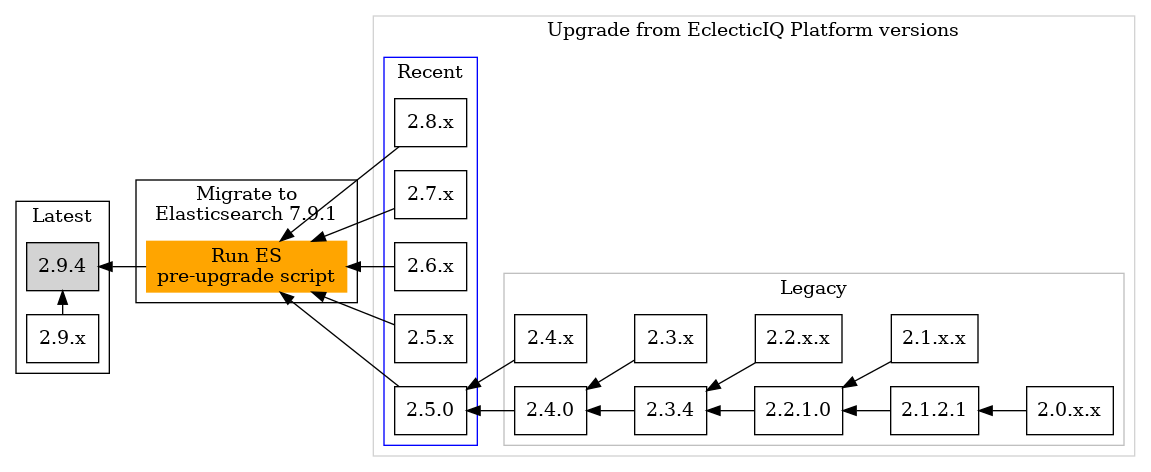Release notes 2.9.4#
Product |
EclecticIQ Platform |
|---|---|
Release version |
2.9.4 |
Release date |
6 January 2022 |
Summary |
Patch release |
Upgrade impact |
Medium |
Time to upgrade |
~15 minutes to upgrade an instance with 1 million entities.
Additional ~6 minutes to run pre-upgrade scripts for upgrading from 2.8.x and earlier. |
Time to migrate |
|
Security fixes#
Tip
To see a detailed list of security issues and their mitigations, go to All security issues and mitigations.
EIQ-2021-0016-2 Log4J <2.15 RCE
This release addresses the recent Log4J RCE disclosure (EIQ-2021-0016-2), covering the following vulnerabilities:
To mitigate these vulnerabilities, we’ve upgraded the following packages bundled with the Intelligence Center:
Before |
This release |
|---|---|
Elasticsearch 7.9.1 |
Elasticsearch 7.16.2 |
Logstash 7.9.1 |
Logstash 7.16.2 |
Kibana 7.9.1 |
Kibana 7.16.2 |
Note
By default, Elasticsearch and Logstash 7.x are not vulnerable to CVE-2021-44832 because the affected configuration files are only writable by cluster administrators.
For more information, see:
Elastic’s updated security advisory for more information.
When Elastic releases Elasticsearch and Logstash 7.16.3, users can upgrade from 7.16.2 to 7.16.3 independently of the Intelligence Center. Customers will be notified when the updated packages are available on EclecticIQ’s repositories.
Known issues#
When you configure the platform databases during a platform installation or upgrade, you must specify passwords for the databases.
Systemd splits log lines exceeding 2048 characters into 2 or more lines.
As a result, log lines exceeding 2048 characters become invalid JSON, causing Logstash to be unable to parse them correctly.
When more than 1000 entities are loaded on the graph, you cannot load related entities and observables by selecting Load entities, Load observables, or Load entities by observable from the context menu.
When creating groups in the graph, it is not possible to merge multiple groups into one.
If an ingestion process crashes while ingestion is still ongoing, data may not always sync to Elasticsearch.
Users can leverage rules to access groups that act as data sources, even if those users are not members of the groups they access through rules.
Running multiple outgoing feed tasks may cause the platform to consume a large amount of memory over time, because certain outgoing feeds such as HTTP download must load the data into memory in order to make it available to feed consumers.
Download#
For more information about setting up repositories, refer to the installation documentation for your target operating system.
EclecticIQ Platform and dependencies for CentOS and RHEL |
Note The platform dependencies URL for versions 2.9 and later is
|
|---|---|
EclecticIQ Platform extensions |
|
Upgrade#
The following diagram describes the upgrade path you should take depending on the platform version you are upgrading from.
For example:
You can upgrade from version 2.9.1 of the platform to 2.9.3 directly,
To upgrade from 2.4.0 to 2.9.3, you must first upgrade to 2.5.0, then upgrade from 2.5.0 to 2.9.3.
When upgrading from 2.8.x and earlier to 2.9.x and later:
You must run the pre-upgrade script to allow it to work with Elasticsearch 7.9.1.
You must run the pre-upgrade script on the platform version you are upgrading from.
For example, when upgrading from 2.8.0 to 2.9.3, you must run the pre-upgrade script on the platform while it is running version 2.8.0.

Upgrade diagram#
From 2.5.0, the upgrades paths have been tested using the EclecticIQ Platform install script compiled by Rundoc.
The script only supports:
Single machine installs.
Instances installed using the platform install script.
and does not support platform instances installed in distributed environments.